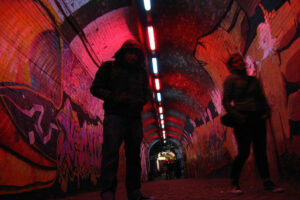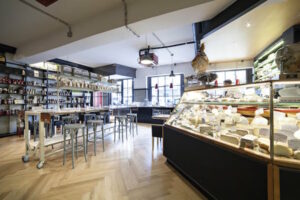Last Updated on December 20, 2025 by Emma Fajcz | Published: February 20, 2019
If we had to pick one central neighborhood that just oozed Rome—for food, people and ambiance—it might be Testaccio.
Located on the banks of the Tiber, Testaccio is one of Rome’s most popular neighborhoods right now, for its many restaurants, markets, and tranquil daytime atmosphere coupled with a whole section of nightclubs.
It wasn’t always like this.
From 1891 to 1970, Testaccio was Rome’s meatpacking neighborhood, with many of the residents working in the gigantic slaughterhouse. The abattoir has since been converted into a museum, and Testaccio from an industrial periphery into a quarter known throughout the city for food.
Down-and-dirty trattorie, once the haunts of meatpackers, still serve traditional Roman cuisine, especially the beloved dishes that used the by-products of the slaughterhouse: sweetbreads, calf intestines, lamb lungs and liver. If that’s your idea of a good meal—or even if you’re more into cacio e pepe, pizza and Roman-style doughnuts—here are the best restaurants in Testaccio.
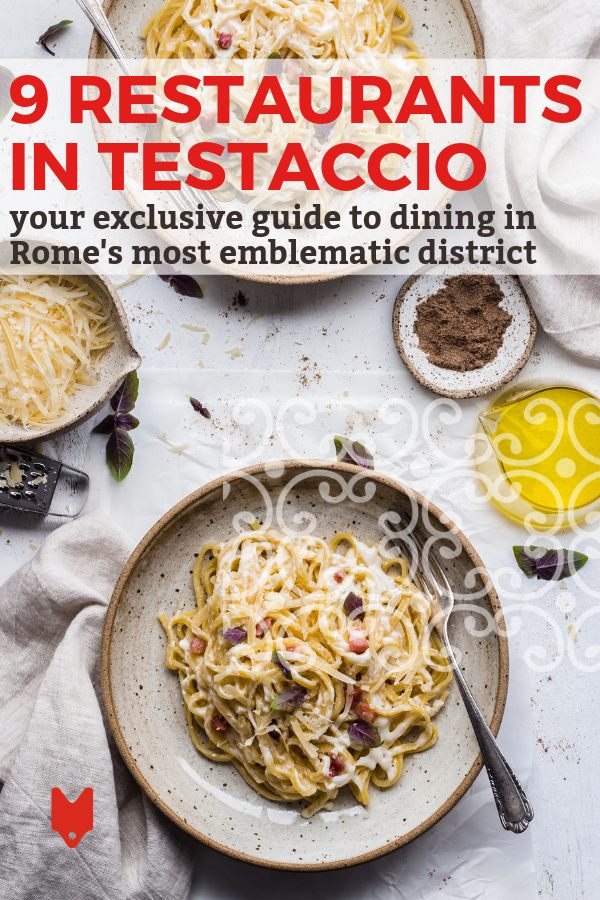
1. Agustarello
Nothing fancy, nothing innovative, just a small menu and a few wood tables in the dining room. That’s all there is at Agustarello, and after 60-some years in Testaccio, that’s all you would want.
Still more of a locals’ place, even as Testaccio becomes increasingly visited by tourists, here Alessandro the chef expertly prepares plates like rigatoni con sugo di coda alla vaccinara (pasta with “tanner-style” oxtail ragù, spiked with pine nuts and warm spice), or cicoria ripassata (bitter green chicory sauteèd in garlic and oil).
Also a good spot to try some of that slaughterhouse cuisine, like tripe or pajata alla piastra (calf intestines, still stuffed with milk, grilled until crispy on the outside and molten inside). Trust us, it’s really good.
2. Passi
Passi (Via Mastro Giorgio, 87) is that rare bakery whose pizza is way better than its bread. And by pizza, we’re talking about pizza bianca.
Bubbly, crisp, almost-fried-tasting because of the generous amount of olive oil brushed on top, it’s pretty hard to pass Passi and not stop in for a strip wrapped in wax paper.
What’s better than pizza bianca? Piazza bianca con la mortazza. That means slicing it horizontally, and draping porky handkerchiefs of mortadella on one half before closing with the other, a salty-sweet-savory package perfect for munching on during a walk.
Check out the video below to find great recommendations and tips for Rome’s Testaccio Market.
3. Volpetti Taverna
Volpetti Salumeria is a world-famous food shop on the Via Marmorata in Testaccio, purveying some of the city’s finest cured meats and cheeses. You can get a hunk of Pecorino Romano DOP shrink-wrapped for your checked luggage, but the best way to enjoy the bounty that is Volpetti is to head around the corner is to the Taverna.
This comfortable space offers a full menu of modern Italian food (think spaghetti with raw shrimp and lime). But Volpetti Taverna is best enjoyed as a wine bar, a wine bar that happens to get all its ingredients from the salumeria next door. Some of the best salame, capocollo and hand-sliced prosciutto you’ll find anywhere, with a glass of local white wine.
The can’t-miss thing?
A “vertical” tasting of Parmigiano Reggiano, each one aged longer than the previous. You’ll never taste “parmesan” the same way again.
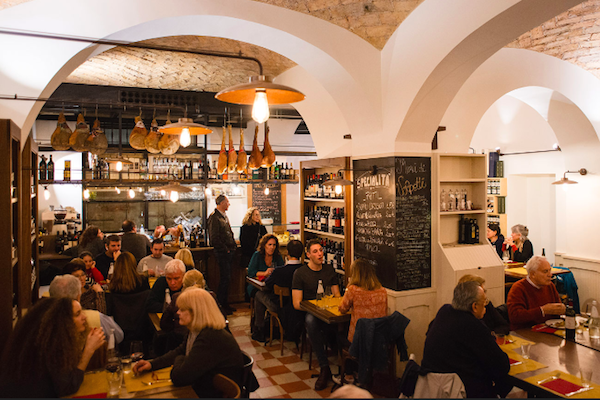
4. Mordi e Vai
As a young man, Sergio Esposito worked alongside his father in Testaccio’s slaughterhouse. Then he was a butcher. Now, you’ll find him in a chef’s hat at his stall in the new Testaccio Market, with a line three-deep.
Mordi e Vai (literally, “bite and go”) serves sandwiches, but these are no ordinary panini. Every day, Sergio prepares different fillings, inspired by traditional cucina romana. There might be allesso alla picchiapò (boiled beef in spicy tomato sauce) or a veal “carbonara” in a decadent cream of eggs, cheese and crispy guanciale.
These sandwiches are so messy they come wrapped in a plastic sleeve to catch any falling bits, and so tasty that after you finish, you’ll be rooting around in that bag trying to find some undiscovered nugget of braised meat. There’s now a second location near the Re di Roma metro stop (Via Appia Nuova 221).
5. Piatto Romano
While you’re wandering around the Testaccio market, you may see Augusto, owner of Piatto Romano (Via G. B. Bodoni, 62), poking artichokes at a greengrocers or chatting with the butcher while he slices steaks. High-quality ingredients, well-executed, make for good meals, but it’s the added sense of place that makes Piatto Romano a great spot to eat.
All the classics are here: cacio e pepe, spaghetti with tiny flat-shell clams, and abbacchio al forno (roast suckling lamb). The best dishes are the fried ones, including luscious olive ascolane (meaty green olives stuffed with shredded beef, breaded and fried) and a superlative carciofo alla giudia (purple artichokes from the Roman countryside, boiled crisp in olive oil). During grape harvest season, you can even get an old Roman favorite — vine-fattened snails, stewed in tomato sauce.
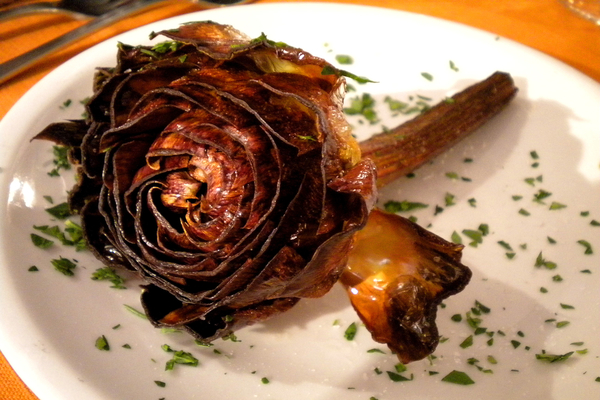
6. Linari
Everyone needs a proper breakfast, and in Rome, that means coffee and a breakfast pastry, very often a cornetto—the Italian version of a croissant, but sweeter and less buttery.
When you walk into Linari in the morning, you’re greeted by the glass-cased bar, piled with cornetti, some plain, others stuffed with cream or jam. A full-service bar, pastry shop, caffeteria and gelateria, Linari is the most popular spot in the neighborhood for all-times-of-day sitting, sipping and snacking.
The morning is the time to go, though. Excellent espresso and foamy cappuccino at the bar needs something sweet, be that a cornetto, a slice of marmalade pie, or a maritozzo (a sweet brioche filled with whipped cream).
Our favorite, though? The ciambella fritta. This is a flat, oblong doughnut, eggy inside and showered with crunchy granulated sugar outside. Dipped into a cappuccino, you’ll wonder why you don’t have breakfast like this every morning.
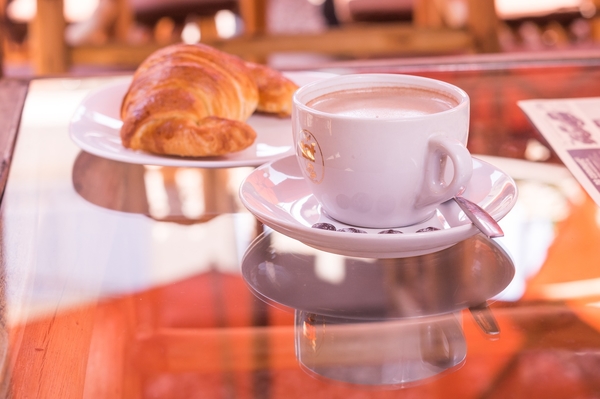
7. L’Oasi della Birra
Officially known as “Enoteca Palombi,” this cavernous spot is really called “The Beer Oasis,” because of the hundreds of bottles that line the walls. Italian, German, Belgian … whatever you want to try, they probably have it.
But this is no simple beer shop though. There’s also a big wine list by the glass, strong Aperol Spritzes, and a full menu, including a hefty cutting board of local cured meats and cheeses.
Inside, the best place to sit is in the wine-cellar basement. In the summer, best show up early and snag one of the picnic tables outside, right in Piazza Testaccio across from the famous amphorae fountain.

8. Il Grottino
The ideal Roman pizzeria is a simple place, with good pies, cold beer, and no-nonsense service. Il Grottino (Via Marmorata, 165) checks all those boxes, and more.
Roman-style pizza is thin and crispy (about half the height of a classic Neapolitan pie). And the pies at Grottino do come out of the wood-burning oven crackling and slightly smoky. But there’s a bit of added heft to the crust that makes the pizza seem more substantial, better prepared to bear the toppings and not split like an earthquake fissure, while still remaining light and flavorful.
Your waiter knows what you want, and won’t waste timing getting it to you: a draught beer, a fried potato croquette, and a pizza—for the hungry, a capricciosa with prosciutto, mushrooms, artichokes and a hard-boiled egg.
9. Fraschetta da Sandro
Known just as “Sandro,” after the owner Sandro Quattrocchi, this tiny wine bar is the last of its kind.
It’s a true fraschetta, meaning a tavern where they serve wine out of barrels, produced on the Quattrocchi farm outside Rome. Red or white are the only choices, and a tumbler will set you back the enormous sum of … €1.
To eat, the ever-affable and generous Sandro will make you a salami sandwich, or a heaping paper plate of marinated vegetables and cheese. At 8:00 a.m. when this little tavern opens, locals are already there with their newspapers and a little glass of vino rosso—for many, this is the only bar in the neighborhood they’ll go to.
If you couldn’t tell, we’re kind of obsessed with Testaccio—and you will be, too, after you join us on our Testaccio Neighborhood Food & Market Tour. After eating your way around this charming neighborhood from breakfast through lunch, you’ll understand more about what it means to live and eat like a Roman—and chances are you’ll even come back to Testaccio on your own to keep exploring this fascinating district and its unshakeable passion for simple, good food.
